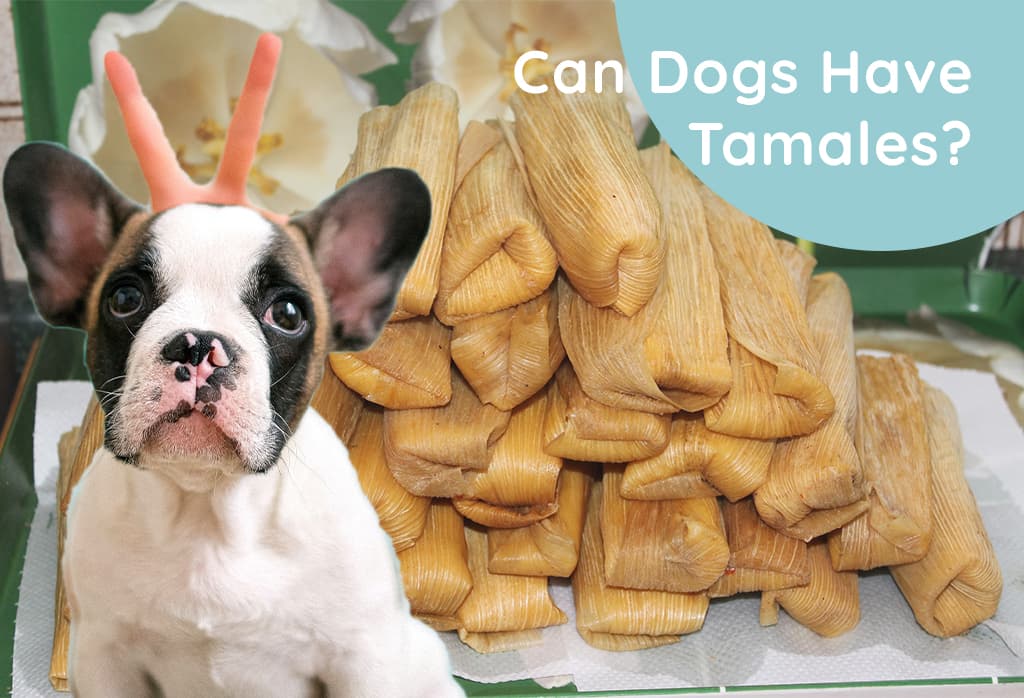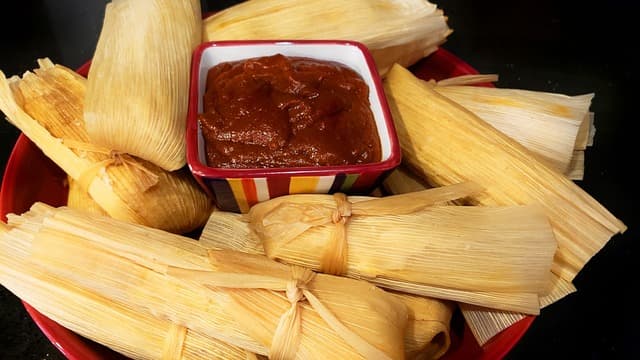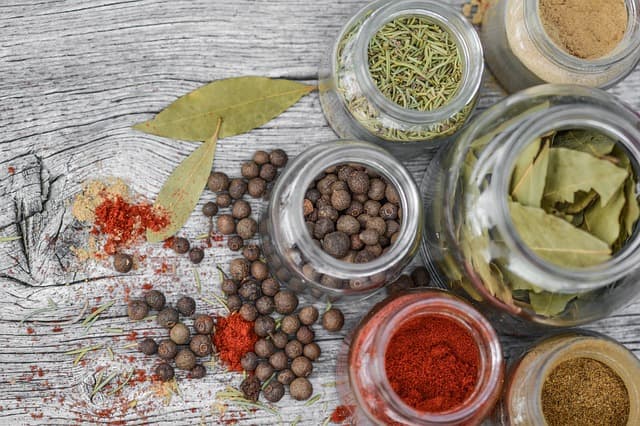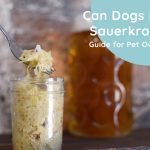In this article, we’re diving into the world of delicious treats – tamales, to be specific.
These scrumptious parcels, originating from Mesoamerica, are usually made of masa (a type of dough made from corn) and filled with mouth-watering meats, veggies, and sauces.
Then, they’re wrapped up in a corn husk or banana leaf and steamed until they reach a level of pure yumminess.
We all know how much our fur babies love to be part of the family, and that includes sharing food.
But before you go passing your plate to your pupper, it’s crucial to understand that not everything we humans enjoy is safe for dogs.
Some foods that we can’t resist might cause some serious problems for our canine companions.
So, let’s get to the bottom of whether dogs can have tamales or not.
Can Dogs Have Tamales?
Tamales, while a delectable treat for us humans, may be a bit too spicy and flavorful for our furry friends.
Here’s a breakdown of what makes tamales a potential danger to dogs:
Spices and seasonings
We all know that the key to a tasty tamale is in the spices and seasonings.
Chili, cumin, and paprika are just a few of the ingredients that give tamales their signature kick.
However, these spices might not agree with our dogs’ sensitive tummies.
Dogs don’t have the same tolerance for spicy foods as we do, so it’s best to keep these zesty flavors out of their reach.
High fat content
The meats and sauces tucked inside tamales are usually rich and flavorful, which also means they’re high in fat.
While our taste buds might appreciate this decadent experience, our dogs’ digestive systems might not.
Foods that are high in fat can cause pancreatitis in dogs, a painful condition that requires medical attention.
Onion and garlic
You might not realize it, but many tamales contain onion and garlic.
These ingredients might make our taste buds dance, but they’re actually toxic to dogs.
Even small amounts can cause anemia or damage to a dog’s red blood cells, so it’s important to steer clear of any foods containing these ingredients.
Why tamales should be avoided for dogs
Now that we’ve explored the potential dangers lurking within tamales, let’s summarize why it’s best to keep these tasty morsels away from our four-legged friends:
Risk of gastrointestinal issues
Dogs have a different digestive system than we do, and they’re not designed to handle the rich flavors and high-fat content found in tamales.
Feeding your dog a tamale could lead to gastrointestinal issues like vomiting, diarrhea, or even pancreatitis.
Trust me, you don’t want to be cleaning up that mess.
Possible toxicity
The onion and garlic found in tamales can be toxic to dogs, even in small amounts.
It’s not worth taking the risk of accidentally poisoning your furry friend just for the sake of sharing a bite of your favorite food.
There are plenty of dog-friendly treats out there that are both tasty and safe for your pup to enjoy.
Ingredients in Tamales That Are Harmful to Dogs
Onions and garlic
We’ve already mentioned that onions and garlic can be toxic to dogs, but let’s dive a little deeper.
Both onions and garlic contain compounds called thiosulfates, which are harmful to a dog’s red blood cells.
Ingesting even small amounts can lead to a condition called hemolytic anemia, which causes the destruction of these cells.
Symptoms can include weakness, vomiting, and even collapse, so it’s best to keep these ingredients far away from your pooch.
Chilies and spices
While we humans may love the heat that chilies and spices bring to our food, they’re not so great for our furry friends.
Spicy foods can cause stomach upset and gastrointestinal issues in dogs, not to mention the discomfort they might experience from the burning sensation.
It’s best to keep your pet’s palate mild and save the spice for your own meals.
High-sodium ingredients
Sodium is necessary for both humans and dogs, but too much of a good thing can lead to problems.
Tamales often contain high-sodium ingredients like processed meats and cheeses, which can be harmful to dogs if consumed in large amounts.
Excessive sodium intake can cause dehydration, increased heart rate, and even seizures in dogs.
So, it’s important to monitor their sodium intake and avoid sharing salty foods like tamales.
Artificial additives and preservatives
Some tamales might contain artificial additives and preservatives to enhance their flavor or extend their shelf life.
While these ingredients might not pose a significant risk to humans, they could cause adverse reactions in dogs.
It’s always best to stick to natural, dog-friendly foods and avoid anything with a long list of unpronounceable ingredients.
Related Questions and Answers
Can dogs have corn?
Corn on its own can be a safe and nutritious treat for dogs when served in moderation.
It’s a good source of carbohydrates, fiber, and essential nutrients like vitamins and minerals.
However, corn can also be a choking hazard, especially if it’s still on the cob.
Be sure to remove the kernels from the cob and serve them in small amounts to prevent any accidents.
You’ll often find corn listed as an ingredient in many commercial dog foods.
While it’s not harmful to dogs when used as a filler or source of carbohydrates, it’s not the most nutrient-dense option available.
Some dogs may also have allergies or sensitivities to corn, so it’s important to monitor your pet for any adverse reactions.
Can dogs have masa?
Masa, the dough made from ground corn that forms the base of tamales, is a gluten-free alternative to wheat-based doughs.
This can be a great option for dogs with gluten sensitivities or allergies.
However, it’s essential to remember that the masa used in tamales often contains other ingredients that may be harmful to dogs, like spices, fats, and salts.
While masa itself isn’t toxic to dogs, it doesn’t offer much in terms of nutritional value.
It’s mostly carbohydrates, with little protein or essential nutrients.
Additionally, masa can be high in calories, which can contribute to weight gain if fed in large quantities.
It’s best to stick to dog-specific foods and treats that provide balanced nutrition for your pet.
What about vegetarian or vegan tamales?
Vegetarian or vegan tamales often use plant-based ingredients like beans, vegetables, and meat substitutes in place of traditional meats.
While these ingredients can be healthier for humans, it’s important to remember that dogs have different dietary needs.
Some plant-based ingredients may still pose risks to your furry friend.
While vegetarian or vegan tamales might seem like a safer option for dogs, they can still contain ingredients that are harmful or provide little nutritional value.
For example, they may still have onions, garlic, spices, or high-sodium ingredients, which can be dangerous for dogs.
Additionally, many plant-based protein sources aren’t as easily digestible or complete for dogs as animal-based proteins.
However, some ingredients found in vegetarian or vegan tamales, like sweet potatoes or certain legumes, can be healthy for dogs in moderation.
It’s essential to carefully evaluate the ingredients in any food you’re considering sharing with your pet to ensure their safety and well-being.
How to Make Dog-Friendly Alternatives to Tamales
It’s crucial to know which ingredients to avoid when making dog treats, especially when you’re trying to whip up a dog-friendly version of a human food like tamales.
Here’s a quick rundown of some ingredients to steer clear of:
Spices and seasonings
As we’ve mentioned earlier, spices and seasonings that give tamales their signature kick are not dog-friendly.
Avoid using ingredients like chili, cumin, and paprika, which can cause stomach upset in dogs.
Onion and garlic
Onion and garlic are toxic to dogs, as they can lead to anemia and damage red blood cells.
Always keep these ingredients out of your dog-friendly recipes.
Artificial sweeteners
Some artificial sweeteners, such as xylitol, are extremely toxic to dogs and can cause rapid insulin release, leading to hypoglycemia (low blood sugar).
Steer clear of any artificial sweeteners when making dog treats.
Recipe for homemade dog-friendly tamale treats
Now that you know which ingredients to avoid, let’s make some dog-friendly tamale treats that your pup can enjoy safely.
Safe ingredients:
- 1 cup cooked, plain brown rice
- 1 cup plain, cooked, and shredded chicken or turkey (make sure it’s boneless and skinless)
- 1/2 cup canned pumpkin (not pumpkin pie filling)
- 1/4 cup finely chopped, steamed carrots
- 1/4 cup chopped, steamed green beans
- 1 beaten egg (for binding)
- Optional: a sprinkle of dog-friendly herbs like parsley or basil for added flavor
Instructions for making dog-friendly tamales:
- Preheat your oven to 350°F (175°C) and line a baking sheet with parchment paper.
- In a large bowl, combine the cooked brown rice, shredded chicken or turkey, canned pumpkin, chopped carrots, and green beans. Mix well to combine.
- Add the beaten egg to the mixture and stir until everything is evenly combined.
- Use your hands to form small, tamale-shaped treats, placing them onto the lined baking sheet.
- Bake the treats for about 25-30 minutes or until they’re firm to the touch and lightly golden.
- Allow the treats to cool completely before serving them to your pup.
Store these homemade dog-friendly tamale treats in an airtight container in the refrigerator for up to one week.
Identifying Safe and Unsafe Human Foods for Dogs
There are plenty of human foods that you can safely share with your furry friend.
Some examples include:
- Plain, cooked meats like chicken, turkey, and lean beef (without bones or skin)
- Cooked, unseasoned fish like salmon and tuna
- Steamed or boiled vegetables like carrots, green beans, and peas
- Plain, cooked grains like rice and quinoa
- Fruits like blueberries, bananas, and apple slices (with seeds removed)
On the flip side, there are some human foods that can be harmful or even toxic to dogs.
Avoid sharing these with your pet:
- Chocolate and caffeine
- Grapes and raisins
- Macadamia nuts
- Alcohol
- Avocado
- Foods high in salt or sugar
When introducing new foods to your dog’s diet, it’s essential to take it slow and observe your dog for any signs of intolerance or adverse reactions.
Here are some tips for a smooth transition:
Start with a small amount of the new food and gradually increase the portion size over several days.
- Watch for signs of gastrointestinal upset, like vomiting, diarrhea, or a lack of appetite.If you notice any of these symptoms, stop feeding the new food and consult your veterinarian.
- Keep in mind that every dog is different, and what may be safe for one dog might not be safe for another.Always monitor your dog’s reaction to new foods and consult your vet if you have concerns.
- Remember that treats, even healthy ones, should only make up a small portion of your dog’s diet. The majority of their nutrition should come from a balanced, high-quality dog food that meets their specific needs.
By understanding which human foods are safe for dogs and which ones to avoid, you can make informed decisions about what to share with your furry friend.
And with a few simple modifications, you can even create dog-friendly versions of your favorite treats, like our homemade tamale treats.
Always prioritize your dog’s health and safety when it comes to their diet, and you’ll both enjoy a happier, healthier life together.
Frequently Asked Questions (FAQ)
What should I do if my dog accidentally eats a tamale?
If your dog manages to sneak a bite of a tamale, don’t panic.
First, assess how much they consumed and take note of the ingredients in the tamale.
If it’s only a small amount and doesn’t contain any obviously toxic ingredients like onions or garlic, you may only need to monitor your dog for any signs of discomfort or illness.
However, if your dog has eaten a significant amount or you know the tamale contains harmful ingredients, it’s best to contact your veterinarian immediately for advice on the next steps.
Are there any other traditional foods that are unsafe for dogs?
Yes, there are several traditional foods from various cultures that can be unsafe for dogs.
Some examples include:
Chocolate desserts and treats (toxic to dogs due to theobromine)
Fruitcakes or desserts containing raisins and currants (can cause kidney failure in dogs)
Foods containing nutmeg, such as pumpkin pie (can cause hallucinations and seizures in dogs)
Alcohol or dishes cooked with alcohol (can cause intoxication, seizures, or even death in dogs)
Always research the ingredients in traditional dishes before sharing them with your dog and consult your veterinarian if you’re unsure about a particular food.
How can I tell if a food item is safe for my dog to eat?
When determining if a food item is safe for your dog, consider the following:
- Check the ingredient list and ensure it doesn’t contain anything toxic or harmful to dogs.
- Consult reputable sources, like veterinary websites or pet health organizations, for information on the safety of specific foods.
- When in doubt, err on the side of caution and avoid sharing unfamiliar or potentially unsafe foods with your dog.
- Consult your veterinarian for personalized advice on your dog’s dietary needs and restrictions.
Can dogs eat other Mexican dishes?
Some Mexican dishes may be safe for dogs in moderation, while others might contain harmful ingredients.
As with any human food, it’s essential to review the ingredients and ensure they’re dog-friendly.
Some dishes, like plain rice and beans, may be safe for dogs if they’re free from spices, onions, and garlic.
However, dishes with heavy sauces, spices, or high-fat content should be avoided.
Conclusion
In summary, tamales are not a safe treat for dogs due to the potential dangers posed by spices, seasonings, onions, garlic, and other harmful ingredients.
Instead, opt for dog-friendly alternatives like homemade tamale treats and familiarize yourself with safe and unsafe human foods for dogs.
As pet owners, it’s our responsibility to prioritize our dogs’ health and safety when it comes to their diet.
Always be cautious when sharing human food with your dog and educate yourself about potential hazards to ensure their well-being.
If you have any questions or concerns about your dog’s diet or the safety of a specific food, don’t hesitate to consult your veterinarian.
They can provide personalized advice and guidance to help you make the best choices for your furry friend’s health.














